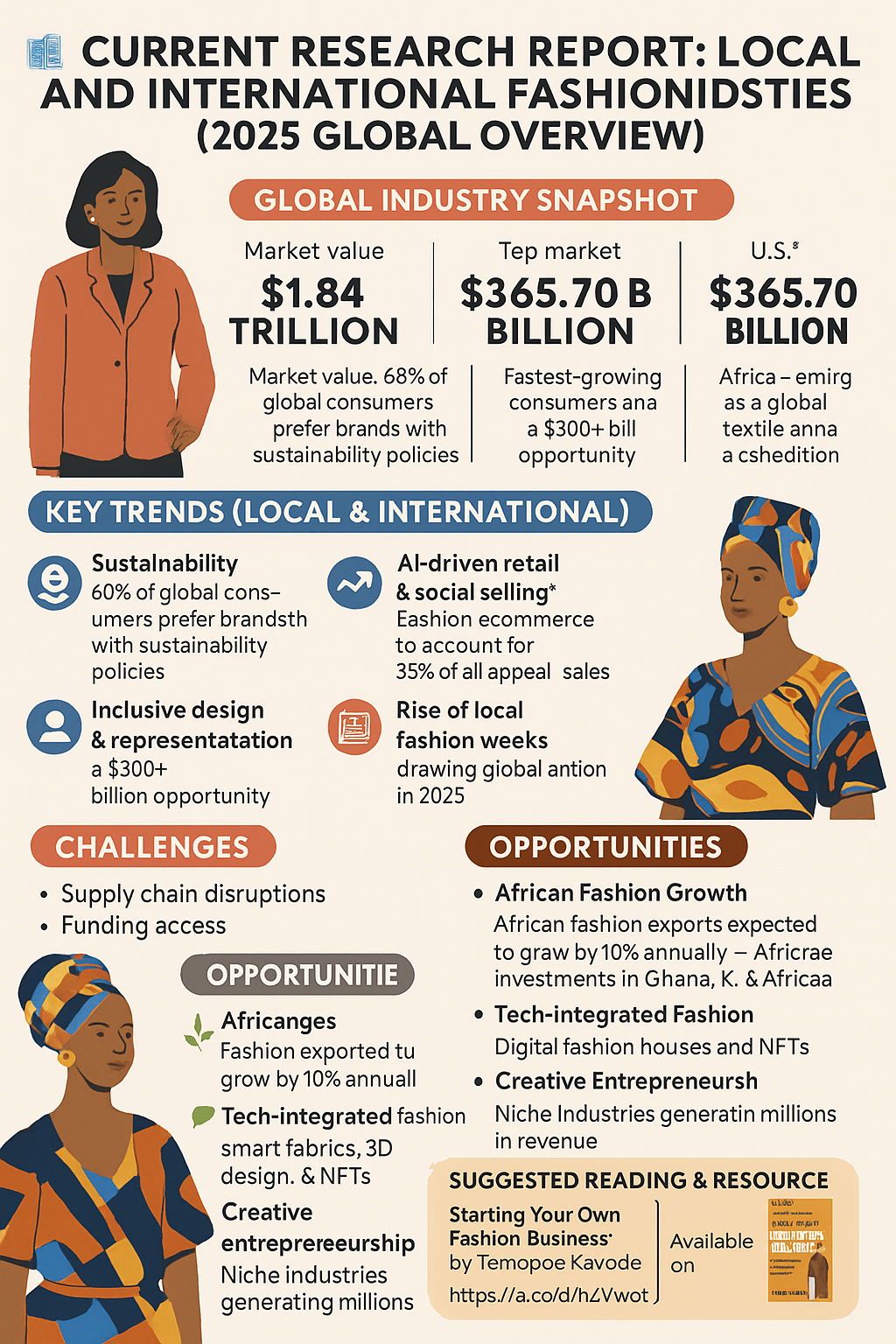Current Research Report: Local and International Fashion Industries (2025 Global Overview)
The fashion industry remains one of the most influential and dynamic sectors globally, shaping culture, economics, technology, and sustainability efforts. This 2025 report provides an in-depth look at the current state of local and international fashion industries, highlighting key trends, challenges, opportunities, and forecasts.
GLOBAL INDUSTRY SNAPSHOT
Market Value: The global apparel market is projected to reach $1.84 trillion in 2025.
Contribution to GDP: Fashion contributes approximately 1.63% to the world’s GDP.
Top Markets:
United States – $365.70 billion (largest individual market)
China & India – fastest-growing consumer bases
Africa – emerging as a global textile and talent hub
KEY TRENDS (Local & International)
1. Sustainability and Ethical Fashion
68% of global consumers now prefer brands with clear sustainability policies.
Major markets are shifting toward eco-friendly fabrics, circular design, recycling, and slow fashion models.
Africa, Latin America, and Southeast Asia are driving innovation in natural dyes, handwoven textiles, and low-carbon production.
2. E-Commerce & Social Commerce
Fashion e-commerce is expected to account for 35% of all apparel sales by 2026.
Social platforms like TikTok, Instagram, and WhatsApp have become powerful retail channels—especially in Nigeria, Kenya, Brazil, and India.
AI-powered shopping assistants, virtual fitting rooms, and metaverse runways are rapidly transforming consumer engagement.
3. Inclusive Design and Representation
Inclusive fashion—plus-size, adaptive clothing, gender-neutral apparel—is a $300+ billion opportunity.
More Black, African, Caribbean, and Indigenous designers are entering luxury and ready-to-wear markets, yet remain underrepresented in high fashion.
4. Rise of Local Fashion Weeks
Regional events such as Maryland Fashion Week, Africa Fashion Week London, Lagos Fashion Week, and Caribbean Fashion Showcase are drawing global attention.
These platforms offer lower entry barriers for emerging designers and attract a growing audience of socially conscious consumers.
5. Secondhand and Resale Boom
The global secondhand market is valued at $218 billion in 2025.
Thrift, vintage, and upcycled fashion are especially booming in urban centers across the U.S., U.K., South Africa, and Ghana.

CHALLENGES
Supply Chain Disruptions: Geopolitical tensions and climate-related issues continue to affect raw materials and manufacturing hubs.
Funding Access: Many talented designers, especially from African and Caribbean regions, lack access to capital and global showrooms.
Greenwashing: Some brands claim sustainability but lack transparency or verification, undermining trust.
OPPORTUNITIES
African Fashion Growth:
African fashion exports expected to grow by 10% annually, driven by diaspora support, cultural pride, and online platforms.
Countries like Ghana, Nigeria, Ethiopia, and South Africa are investing in textile innovation and designer incubation.
Tech-Integrated Fashion:
Smart fabrics, NFTs, 3D design tools, and AI are giving rise to digital fashion houses.
The future includes virtual fashion influencers, immersive fashion retail, and blockchain-verified couture.
Creative Entrepreneurship:
Fashion as a career is gaining traction among youth globally.
Niche industries (modest fashion, Afro-streetwear, fashion tech, etc.) are generating millions in revenue and reshaping what “mainstream” looks like.
RECOMMENDATIONS FOR CREATIVE LEADERS
Invest in Niche Skills (from styling to fashion tech)
Leverage Local Fashion Weeks to build global visibility
Promote Cultural Authenticity over mass mimicry
Adopt Ethical Practices as a foundation, not a trend
Build Digital Infrastructure to connect with global markets
Suggested Reading & Resource
Starting Your Own Fashion Business by Temitope Kayode
Available on Amazon: https://a.co/d/hLZVwot
This guide offers 25 profitable niches under the fashion umbrella with step-by-step guidance on branding, funding, and growth.
Final Thought
The future of fashion is glocal—both globally inspired and locally rooted. For Black, African, and Caribbean creatives, this is a pivotal moment to lead innovation, tell authentic stories, and reclaim ownership in the fashion economy.
Let’s continue building inclusive, sustainable, and empowering fashion ecosystems for all.
